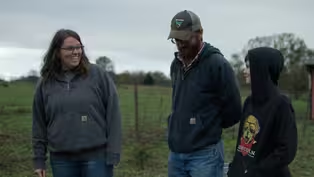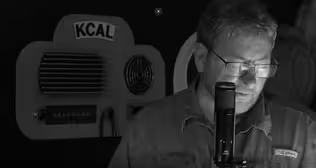
Poets of Kentucky: Silas House
Clip: Season 30 Episode 13 | 7m 4sVideo has Closed Captions
Current Kentucky Poet Laureate Silas House
National poetry month is a celebration of poetry that occurs every April and it is my belief that some of the best poetry in the world originates right here in our beautiful commonwealth. That’s why this month we’ll be bringing you a series of stories about Kentucky based poets, starting with this one about our most recent Poet Laureate: Silas House.
Problems playing video? | Closed Captioning Feedback
Problems playing video? | Closed Captioning Feedback
Kentucky Life is a local public television program presented by KET
You give every Kentuckian the opportunity to explore new ideas and new worlds through KET. Visit the Kentucky Life website.

Poets of Kentucky: Silas House
Clip: Season 30 Episode 13 | 7m 4sVideo has Closed Captions
National poetry month is a celebration of poetry that occurs every April and it is my belief that some of the best poetry in the world originates right here in our beautiful commonwealth. That’s why this month we’ll be bringing you a series of stories about Kentucky based poets, starting with this one about our most recent Poet Laureate: Silas House.
Problems playing video? | Closed Captioning Feedback
How to Watch Kentucky Life
Kentucky Life is available to stream on pbs.org and the free PBS App, available on iPhone, Apple TV, Android TV, Android smartphones, Amazon Fire TV, Amazon Fire Tablet, Roku, Samsung Smart TV, and Vizio.
Providing Support for PBS.org
Learn Moreabout PBS online sponsorshipNational Poetry Month is a celebration of poetry that occurs every April.
Now, I really believe some of the best poetry originates right here in our beautiful commonwealth.
And that's why this month, we'll be bringing you a series of stories about Kentucky-based poets, starting with this one about our most recent poet laureate, Silas House.
Born in Corbin, House still calls Kentucky home to this day.
He was honored with the Poet Laureate Award position in 2023 and has been a powerful figure in promoting what makes Kentucky such a special place.
Let's learn a little bit more about House in the first installment of Poets of Kentucky.
[music playing] In high school, the biggest dare was to slink over the slick rocks flanking Cumberland Falls, where the wide but shallow river dives 70 feet into a deep pool of froth.
There, people say, catfish big as men There, people say, catfish big as men twist and slither, awaiting supper sped their way.
You can see a rainbow at night shimmering on the mist during a full moon and a clear sky.
This is true.
I snuck behind the green curtain once with my best friend, whose name I won't say because he never came out.
Just as we reached the bale of water, where we would disappear into another world, I slipped.
My right leg slid down the cold boulder.
And before I could plunge into the churning chaos where torrent met river, he grabbed hold of my hand.
I was so electrified by his touch.
I didn't think of how close I was to being swept away.
Instead, I thought how a small moment of ecstasy was akin to drowning.
He held on for a beat longer than necessary.
The roar behind the falls was a deafening symphony heard only by those brave enough to penetrate this dark-sued cavern carved by centuries, fern-laden, alive with the smell of moss, a secret cathedral made of wildness and wet.
We were mesmerized and stood watching the cascade as if frozen, yet as if we might see through to the other side.
I'm from southeastern Kentucky, and I write a lot about working-class issues, people of faith, LGBTQ people, the rural experience, and I'm hoping to always expand people's notions of what that means.
I'm trying to tell the story of a rural place in Kentucky and Appalachia as I know it to be true.
I never want to vilify the place, but I also never want to romanticize the place.
Both of those are stereotyped in the place.
So, I'm just always trying to tell the most authentic story I can.
Well, I grew up in a little bitty town called Lilly right outside of Corbin, Kentucky, kind of near Cumberland Falls.
That's sort of my point of reference for people.
So, it was a place of great natural beauty, but also a place where I witnessed a lot of devastation.
I grew up across from a strip mine, and so it was always like the beauty of the natural world juxtaposed against the devastation of the natural world.
So, I think that set up a sense of injustice for me from a young age.
It's one of the reasons I'm a writer.
Growing up as a little gay boy gave me an extra layer of the outsider, and writers need to be outsiders.
So, I felt very much an insider as far as being rural, being Appalachian, being of that culture, but also very much an outsider in other ways.
And I think that served me well as a writer.
It often caused me to be stepping back and just taking note of things and observing, getting the lay of the land.
I think the main thing for me being Poet Laureate was to just try to represent as many Kentuckians as I could and to talk about the arts as much as I could.
There was a lot made of me being the first openly gay Poet Laureate, and I feel like that is important representation.
But I feel like it's equally important representation that I'm a Poet Laureate who was raised in the trailers of Appalachia, because most people think that you can't be in the literary world or in the academic world if you've come from the trailers and hollers of Appalachia.
And, of course, that's not true.
It's also important to me to talk about being a person of faith, especially being an LGBTQ person of faith from working-class backgrounds.
So, I just think that talking about all those multitudes and how they come together, that represents a lot of people, because most of us have those multitudes.
We're not just one thing, you know?
I think poetry is the highest literary art form.
To me, it's the most difficult.
It's the biggest challenge.
Mostly because you're having to do in, I don't know, a four-stanza poem the same thing that you have have to do in a 400-page novel, and that is articulate some abstract notion that will make the reader feel something, see something, experience something.
Every form of art, whether it's film, a novel, or a poem, they have to do the same thing.
But a poem has a lot less space to do that.
It's the smallest canvas you have.
For me, good poetry always conjures an image that I can see in my mind, but it also makes me feel something.
It makes me hear music.
So, to me, it's like about image, music, action, emotion.
Those are the key things that I'm trying to deliver in a poem.
[bell chiming] Sundays, the bells and birds compete to testify a new morning while grief pins me again to the bed.
This Sunday shares the sacred lonesome when all the world seems at peace and quiet.
Witness this day a wide darkness as all Sundays are full of harm for small beings, whether sparrows or those who make music and pick out their own clothes.
Couples stroll in their best and eat in the windows just the way it should be, but there's no Sabbath for dogs and the winged things, nor those who can find sacredness in cedar trees, grief, and light.
Oh, love, please protect us.
[music playing]
Bucking the Trend: Kentucky’s Young Farmers
Video has Closed Captions
Clip: S30 Ep13 | 8m 47s | Two Western Kentucky farmers are bucking the trend - choosing agriculture over city life. (8m 47s)
Video has Closed Captions
Clip: S30 Ep13 | 6m 44s | KCAL Old Time Radio recreates radio shows from the 1940s and 50s and performs them live. (6m 44s)
Providing Support for PBS.org
Learn Moreabout PBS online sponsorshipSupport for PBS provided by:
Kentucky Life is a local public television program presented by KET
You give every Kentuckian the opportunity to explore new ideas and new worlds through KET. Visit the Kentucky Life website.















